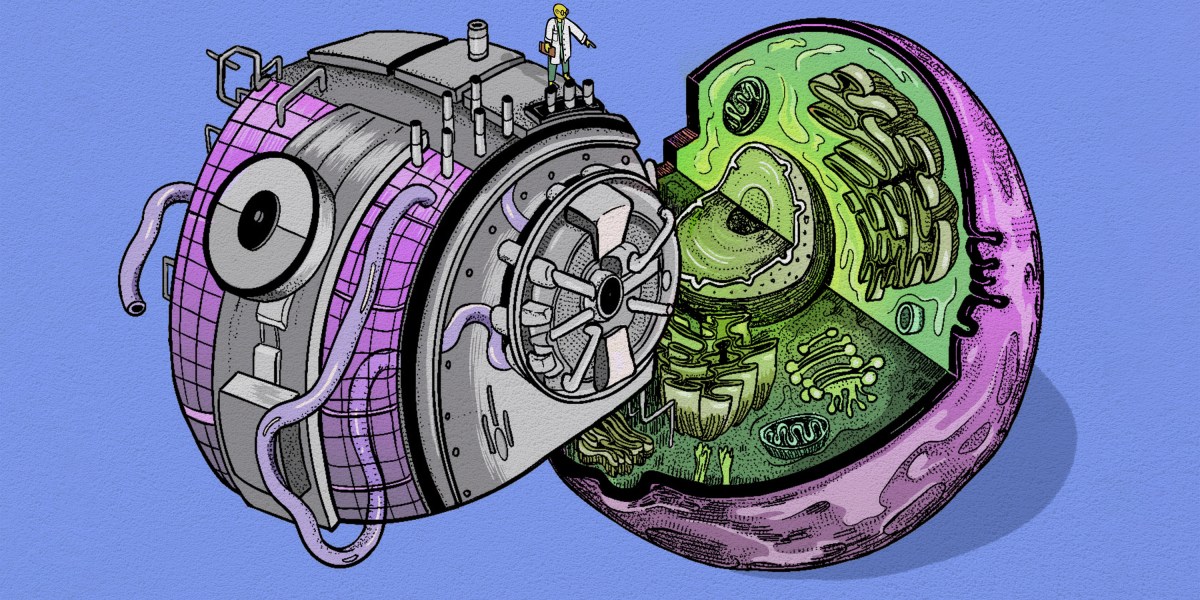The Download: AI to cure diseases, and China’s deepfake influencers
This is today’s edition of The Download, our weekday newsletter that provides a daily dose of what’s going on in the world of technology.
How AI can help us understand how cells work—and help cure diseases
Priscilla Chan and Mark Zuckerberg are cofounders and co-CEOs of the Chan Zuckerberg Initiative.
Cells are key to understanding disease—yet so much about them remains unknown. We do not know, for example, how billions of biomolecules come together to act as one cell. Nor do we know how our many types of cells interact within our bodies. We have limited understanding of how cells, tissues, and organs become diseased and what it takes for them to be healthy.
AI can help us answer these questions and apply that knowledge to improve health and well-being worldwide—if researchers can access and harness these powerful new technologies. Scientific discovery, patient diagnosis, and treatment decisions would all become faster, safer, and more efficient.
At the Chan Zuckerberg Initiative, we’re helping to generate the scientific data and build out the computing infrastructure to make this a reality—and give scientists the tools they need to take advantage of new advances in AI to help end disease. Read the full story.
This article is free to read—you just need to create an account. (If you already have one – just sign in!)
Deepfakes of Chinese influencers are livestreaming 24/7
Scroll through the livestreaming videos at 4 a.m. on Taobao, China’s most popular e-commerce platform, and you’ll find it weirdly busy. While most people are fast asleep, there are still many diligent streamers presenting products to the cameras and offering discounts in the wee hours.
But if you take a closer look, you may notice that many of these livestream influencers seem slightly robotic. That’s because they are AI-generated clones of the real streamers.
As technologies that create realistic avatars, voices, and movements get more sophisticated and affordable, the popularity of these deepfakes has exploded across China’s e-commerce streaming platforms. Read the full story.
—Zeyi Yang
Meet the next generation of AI superstars
This year we’ve seen tech companies racing to release their hottest new AI systems, while often neglecting safety and ethics. Thankfully, there’s a legion of young AI scientists who are more aware than ever of the harm the technology can pose, and are determined to fix it.
To do that, they’re pioneering new methods that are helping to shift the way the AI industry thinks about safety. Some of them are honored in our annual 35 Innovators Under 35 list.
Melissa Heikkilä, our senior AI reporter, has taken a closer look at the brilliant minds working towards making AI safer, more useful, and less polluting. Read the full story.
This story is from The Algorithm, our weekly AI newsletter. Sign up to receive it in your inbox every Monday.
She was a semi-pro Go player but learned that biology is even harder
When an AI beat one of the world’s best Go players in 2017, Julia Joung felt relieved. She’d spent her childhood in Taiwan mastering the ancient game and once aspired to become a professional player, representing her country.
But by the time Google’s AlphaGo cracked the game, Joung had already moved onto a harder problem. At Stanford University, during her undergraduate research in a neuroscience lab, she observed unusual behavior in brain cells called astrocytes. Biology, she realized, was harder than Go. And it was her new fascination. Read the full story.
—Antonio Regalado
Julia Joung is one of MIT Technology Review’s 35 Innovators Under 35 for 2023. Read the full list of this year’s honorees, including those making a difference in robotics, computing, biotech, climate and energy, and AI.
The must-reads
I’ve combed the internet to find you today’s most fun/important/scary/fascinating stories about technology.
1 Google and Microsoft are tussling over AI again
Both companies are updating their AI products this week, and Google’s Bard is first up. (Vox)
+ It’s safe to say that OpenAI is well on its way to becoming a tech giant. (Economist $)
+ Google is throwing generative AI at everything. (MIT Technology Review)
2 YouTube has suspended Russell Brand’s channels from making money
The British comedian has been accused of rape and sexual assault. (BBC)
+ Brand’s conspiracy theories are being pushed to new audiences. (NBC News)
3 X might start charging all users a monthly fee, says Elon Musk
Will it happen though? Who knows! (The Guardian)
+ He didn’t disclose how much it’s likely to cost, though. (CNBC)
+ Musk failed to denounce antisemitism during a meeting with the Israeli prime minister. (WP $)
4 MGM Resorts were hacked after its IT help desk was breached
Disrupting dozens of resorts and casinos in the process. (Bloomberg $)
+ Over in Las Vegas, the hack has spelt chaos for casino workers. (404 Media)
5 Amazon is still searching for its next big thing
It’s got e-commerce, delivery and cloud computing sewn up. But what’s next? (WSJ $)
+ It’s still pushing into healthcare and groceries, though. (Insider $)
+ The company is fighting back against accusations of poor working conditions. (WP $)
6 US immigration officials are using a powerful new tracking tool
ShadowDragon can monitor everyone from parents-to-be to bodybuilders. (404 Media)
+ Microsoft accidentally revealed private data on GitHub. (Bloomberg $)
7 America’s banks are fighting back against Big Tech
They’re unimpressed by the likes of Apple and Google treading on their toes. (FT $)
+ Apple Pay makes it super easy to splash your cash. (Vox)
+ Is the digital dollar dead? (MIT Technology Review)
8 Climate change is devastating ski resorts 
A lack of snow has forced savvy resort managers to switch to new, drier sports. (Wired $)
9 Cuba’s unofficial Apple Geniuses are local celebrities
When Apple’s components are restricted goods, repair experts have to get creative. (Rest of World)
10 Leftover covid drugs are helping to treat infected cats
It tackles a coronavirus that is fatal to felines, but doesn’t affect humans. (The Atlantic $)
+ Who benefits most from the new covid vaccines? (MIT Technology Review)
Quote of the day
“The whole point of competition is for a company to differentiate itself from rivals. Not to align with rivals so that all are the same.”
—Thomas Graf, a lawyer representing Google, tries to convince judges to overturn a $2.6 billion fine imposed by the EU for unfairly promoting Google’s shopping services over its competition, Reuters reports.
The big story
The big new idea for making self-driving cars that can go anywhere
May 2022
When Alex Kendall sat in a car on a small road in the British countryside and took his hands off the wheel back in 2016, it was a small step in a new direction—one that a new bunch of startups bet might be the breakthrough that makes driverless cars an everyday reality.
This was the first time that reinforcement learning—an AI technique that trains a neural network to perform a task via trial and error—had been used to teach a car to drive from scratch on a real road. It took less than 20 minutes for the car to learn to stay on the road by itself, Kendall claims.
These startups are betting that smarter, cheaper tech will let them overtake current market leaders. But is this yet more hype from an industry that’s been drinking its own Kool-Aid for years? Read the full story.
—Will Douglas Heaven
We can still have nice things
A place for comfort, fun and distraction in these weird times. (Got any ideas? Drop me a line or tweet ’em at me.)
+ We’re fast approaching fall and you know what that means: a load of new films to dive into.
+ These Japanese lifestyle magazines are beyond cool ($)
+ Paul Mescal seems like a thoroughly nice guy.
+ London’s blue plaques are a fascinating part of the city’s history, and now there’s 1,000 of them.
+ After all these years, Liam Neeson is still in peril.




